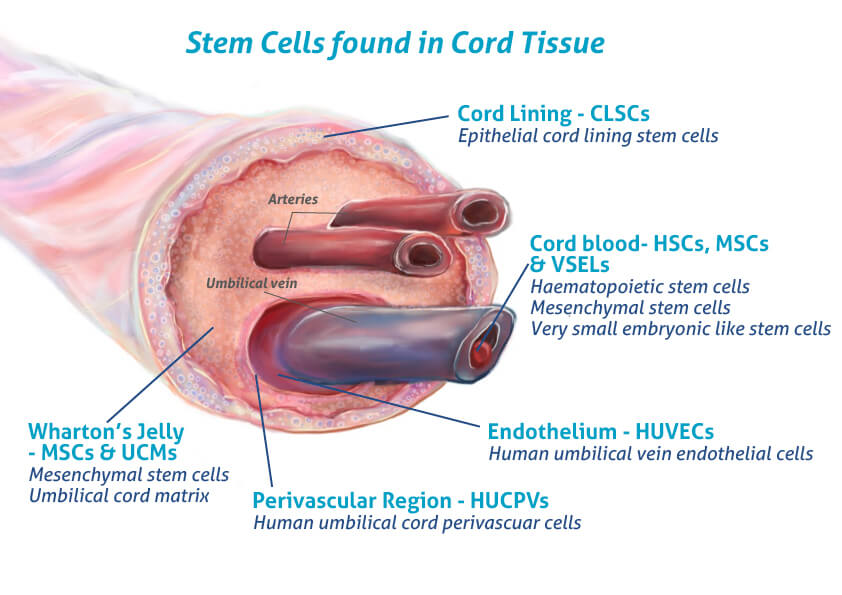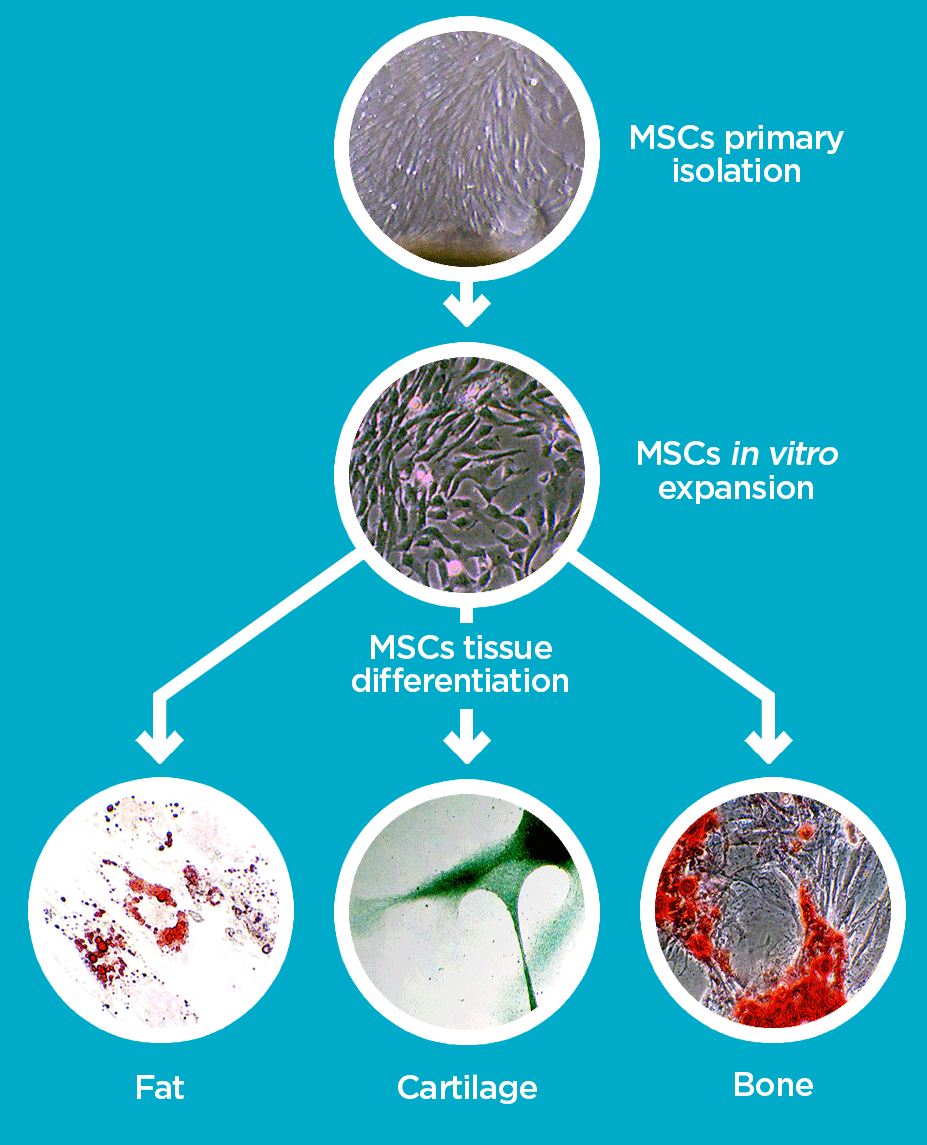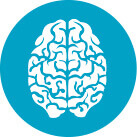Cord Tissue Banking
The Umbilical Cord Tissue
Umbilical cord tissue is the piece of umbilical cord that is rich in mesenchymal stem cells (MSCs) that are crucial for tissue repair or replacement. Extensive research indicates their vast potential in the field of regenerative medicine, with compelling studies showcasing that the MSCs within umbilical cord tissue could revolutionize organ regeneration treatments. This emerges as one of the most exciting area of regenerative medicine.
In 2014, Cells4Life is the first UK stem cell bank to release a cord tissue sample for therapy. The transplant was performed in Guys & St Thomas’, UK for the treatment of Epidermolysis Bullosa. Click here to view our sample releases
What is Cord Tissue Banking?
Cord Tissue banking is the process of collecting the piece of a newborn baby’s umbilical cord, after it has been cut away and preserving it long-term.
Once the cord blood has been collected, your doctor or midwife will then proceed on collecting the piece of umbilical cord using the materials provided in the Cells4Life collection kit. We’ll handle the shipping, processing and storage of the umbilical cord sample collected. If needed for transplant, we will ship your sample to the treatment facility, free of charge for approved treatment or therapy.
Cells4Life provides parents the unique option of storing the umbilical cord stem cells in multiple subdivisions which means that a small portion of the sample can be released as needed and the remaining sample is kept in storage until required for future use.
Storing the cord tissue, together with the cord blood ensures that your child has the maximum range and highest number of umbilical cord stem cells as possible available to them.

Cord Vessel
The cord vessel is also a rich source of valuable cells including:
- Human Umbilical Vein Endothelial Cells (HUVECs) – These cells are easy to culture and are commonly used in research for vascular biology – including inflammation, blood clotting and angiogenesis (the formation of new blood vessels).
- Epithelial Cord Lining Stem Cells (CLSCs) – These cells have proved effective in treating difficult-to-heal human wounds, such as diabetic ulcers, corneal defects, and have also demonstrated successful regeneration of the liver and heart in animal studies.
- Human Umbilical Cord Perivascular Cells (HUCPVCs) – These cells found in the umbilical cord are being investigated for bone formation and dermal tissue engineering.
Wharton’s Jelly
Wharton’s jelly contains mesenchymal stem cells (MSCs) that have the ability to differentiate into various cell types:
- Regenerative Potential: Wharton’s jelly stem cells, derived from the umbilical cord, are multipotent and hold promise for regenerative medicine, capable of differentiating into various cell types for tissue repair.
- Immunomodulatory Properties: These stem cells exhibit immunomodulatory effects, making them potentially valuable in treating autoimmune diseases and conditions involving inflammation by regulating the immune response.
- Low Risk of Rejection: Derived from the typically discarded umbilical cord, Wharton’s jelly stem cells present a lower risk of rejection in therapeutic use, as they are less likely to trigger an immune response in recipients compared to cells from other sources.
The Cells4Life Advantage
Stem cells possess two vital characteristics:
- Self-renewal capability
- Capacity for differentiation into various cell types
We have not only proven the viability but also the preservation of these essential properties in the mesenchymal stem cells (MSCs) sourced from your baby’s umbilical cord tissue through our transportation, processing, and cryopreservation techniques.
Our approach involves isolating MSCs from collected cord tissue samples, expanding their numbers, and inducing their transformation into diverse tissue types.
Our successful cultivation of primary cell types found in bone, adipose, and cartilage tissues affirms the preservation of MSC ‘stemness’ through our methods, a critical aspect for potential therapeutic applications.
By entrusting us with the storage of your baby’s umbilical cord tissue, you can be confident that you are harnessing the full potential of these valuable stem cells.
Our experiments demonstrate:
- Umbilical cord tissue samples processed and stored by Cells4Life contain MSCs that can be isolated and expanded into billions of cells.
- These MSCs exhibit the capacity to differentiate into fat, cartilage, and bone cellular lineages, highlighting their remarkable versatility.

Umbilical cord is currently being investigated for the treatment of the following conditions:
- Ulcerative colitis
- Type 2 Diabetes
- Traumatic optic neuropathy
- Stroke
- Spinal cord injury
- Sepsis
- Rheumatoid arthritis
- Retinitis pigmentosa
- Psoriasis
- Parkinson’s disease
- Ovarian failure
- Osteoarthritis
- Myocardial infarction
- Multiple Sclerosis
- Liver failure
- Erectile Dysfunction
- Connective tissue diseases
- Cerebral Palsy
- Cartilage repair
- Cardiomyopathy
- Aplastic anaemia
- Alzheimer’s disease
- And many more…
Exploring the Potential of Umbilical Cord Stem Cell Treatments

Neurological Conditions
At Duke University in North Carolina, groundbreaking research is underway to treat autistic children using intravenous infusions of mesenchymal stem cells derived from cord tissue. Early clinical trials have shown promising results, offering hope to families seeking innovative therapies.

Heart & Vascular Disease
Scientific breakthroughs in cardiac tissue engineering have emerged with the use of mesenchymal stem cells sourced from cord tissue. These advances bring optimism to patients battling heart failure, as researchers work towards new treatment options.

Diabetes
A clinical trial is making strides in utilizing Wharton’s Jelly-derived mesenchymal stem cells found within umbilical cord tissue to address diabetes—a condition impacting 415 million individuals worldwide. These efforts aim to provide effective solutions for those living with diabetes.

Skeletal Conditions
Mesenchymal stem cells derived from cord tissue are being explored in clinical trials as a potential treatment for Multiple Sclerosis—a condition affecting the brain and spinal cord. Remarkably, doctors have observed symptom improvements in as little as one month, offering new hope to those affected.

Cancers
Research from 2014 uncovered promising results as umbilical cord tissue mesenchymal stem cells demonstrated the inhibition of tumor growth associated with prostate cancer. Ongoing investigations suggest similar potential benefits for individuals battling breast cancer, shedding light on novel therapeutic avenues.

Inflammatory & Autoimmune Conditions
In Durham, North Carolina, dedicated researchers have made significant strides in understanding the potential of mesenchymal stem cells for treating sepsis—an inflammatory condition arising from the body’s exaggerated response to infection. Their findings hold promise for future interventions in inflammatory and autoimmune disorders.
The exploration of umbilical cord stem cell treatments holds potential future in medical advancements. The unique umbilical cord stem cells readily available at birth, could revolutionize healthcare. At Cells4life we offer cord tissue banking services in addition to cord blood, contact us today to get started!


